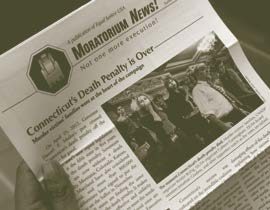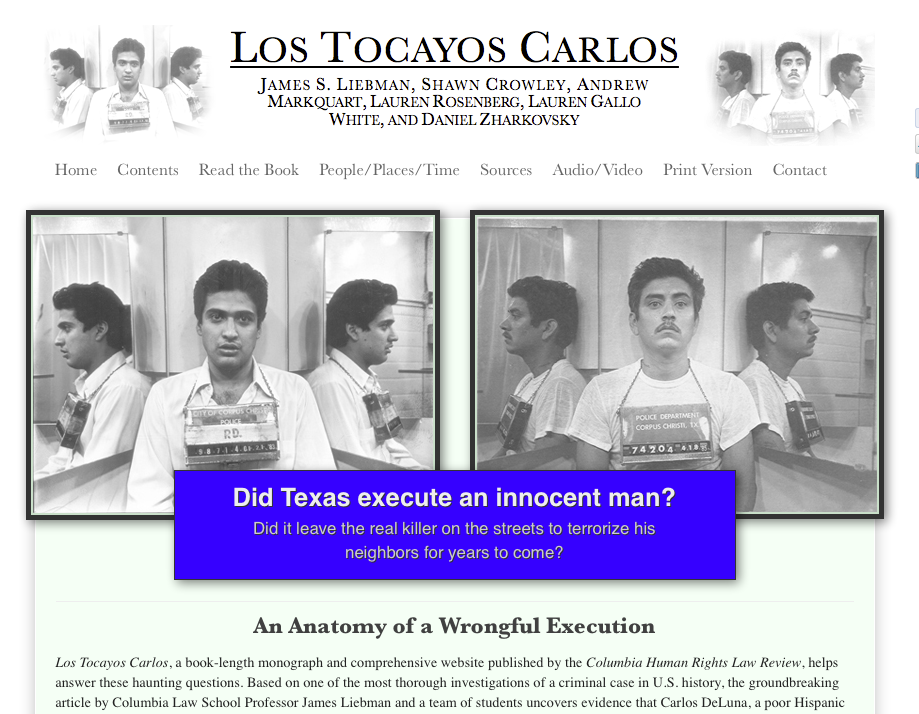
You might notice some differences in this issue of our newsletter. For starters, the name. Not to mention our logo,
tagline, and overall look. The fact is, EJUSA has been changing and growing for a long time. Now, our outside is catching up to our insides.
Where we were: Moratorium Now!
The 1980s and ‘90s saw an avalanche of exonerations from death row. They provided a window into all the things that can go wrong in a criminal case. The death penalty was suddenly under a national spotlight, its fairness and accuracy called into question.
In 1997, the American Bar Association called to suspend all executions until these issues were studied and addressed.
EJUSA and other organizations seized the moment to launch a grassroots campaign for a moratorium. We called it Moratorium Now!
Three years later, Illinois Republican Governor George Ryan declared a moratorium on executions. Maryland quickly became the second state to impose a moratorium. And just one year later, North Carolina’s State Senate voted ‘yes’ on moratorium.
These “ceasefires” provided an opportunity for an objective and reasoned analysis of the death penalty’s flaws. Studies and investigations in a variety of states revealed a system that was hopelessly broken. The political inertia that once characterized the movement to end the death penalty was forever shattered.
From Moratorium to Repeal
The era of moratoria changed America’s conversation about the death penalty. Death penalty supporters came to believe that it was a failed system and couldn’t be fixed. National repeal organizations grew – groups like the National Coalition to Abolish the Death Penalty, Murder Victims’ Families for Reconciliation, Murder Victims’ Families for Human Rights, People of Faith Against the Death Penalty, and of course, EJUSA.
New York and New Jersey became the first two states to end the death penalty completely, in 2007. New Mexico repealed its death penalty in 2009, Illinois in 2010, and Connecticut in 2011. Many more states have come close to repeal. California,Kansas, Maryland, and Montana all appear to be on track to repeal their death penalties within the next few years. The era of repeal is here.
Setting our sights higher
We always knew that the death penalty’s failures were just a microcosm of what was wrong with the entire criminal justice system. Getting rid of it wouldn’t magically transform our system into one that worked. But it would remove one major obstacle to that broader vision. As we worked hand in hand with families of murder victims on repeal campaigns, however, we learned that the needs were too urgent to wait until the death penalty was gone.
Victims’ family members taught us that services like counseling to cope with trauma, financial assistance for lost wages, funeral expenses, help navigating the legal process, and time off from work are sorely lacking. This neglect is especially pronounced in communities of color, where people are most likely to be victimized by crime.
The consequences are disastrous. Crime survivors are more likely to experience lifelong mental health issues, which can lead to unemployment, divorce, drug and alcohol abuse, and more – some of the same factors that fuel continued violence
Yet the criminal justice system – often in the name of crime victims – ignores many of those needs and focuses only on what we do to the offender after the fact. This reactive approach is failing all of us.
Our makeover is more than a paint job. It is our effort to articulate a new vision of justice that works for everyone – one that prevents violence before it occurs, helps crime victims rebuild their lives, and creates opportunities for former offenders so they won’t repeat the harm.
Ending the death penalty will remain our primary work. Now we will round it out with a new program to help crime survivors in underserved communities to advocate for their needs. And we will continue to build bridges to find common ground solutions that keep us all safer.
We look forward to working with you to realize our renewed vision.
